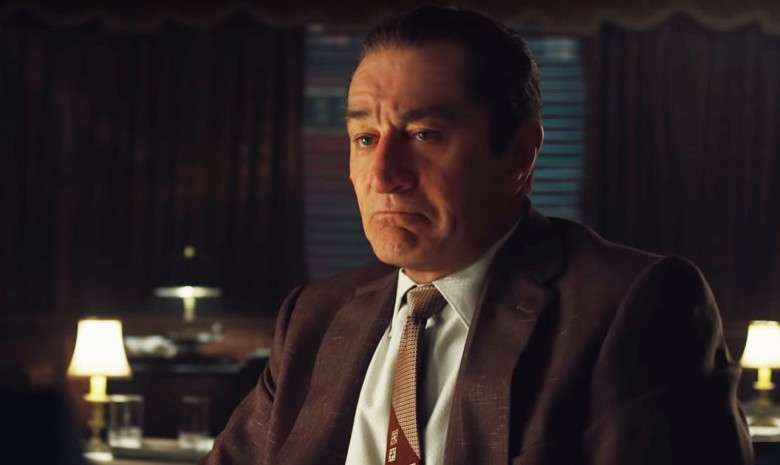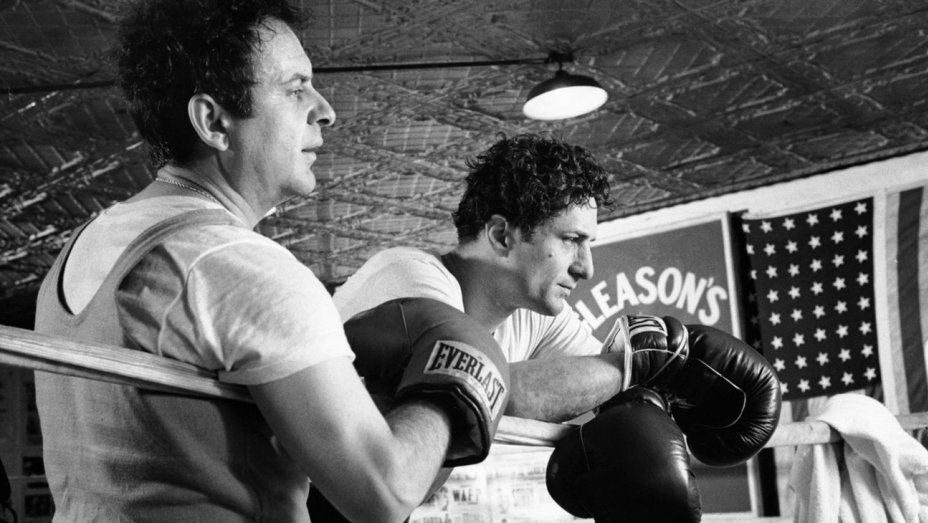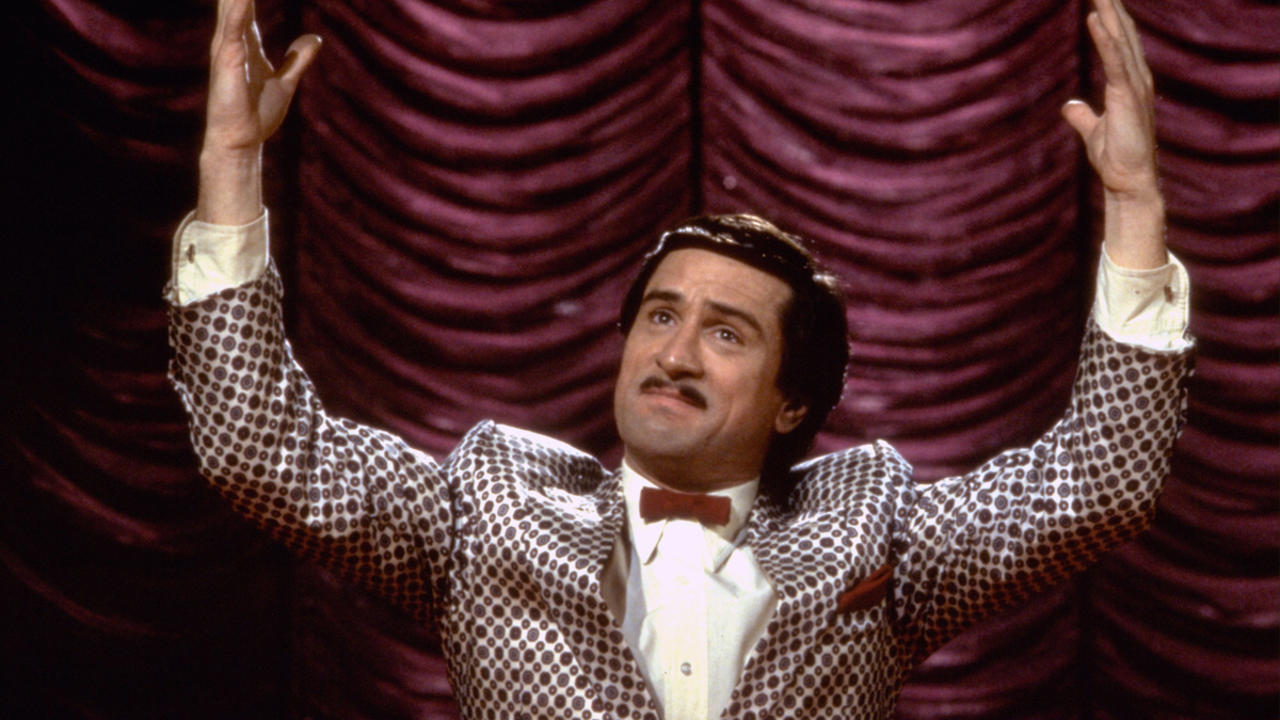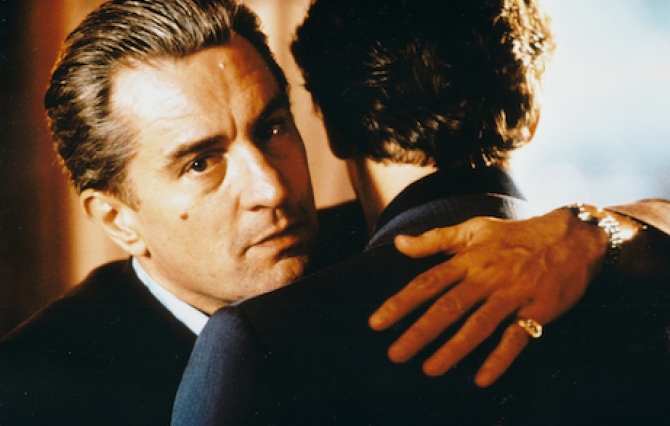5. The Irishman (2019)

Let’s not beat around the bush—yes, ’The Irishman’ is a long movie. The 2019 Netflix production tested bladders and attention spans all across the globe with a gargantuan 3½ hour-long runtime that marked a new high in Scorsese’s career. And sure, long-time editor Thelma Schoonmaker could’ve plausibly trimmed it out by a healthy hour without really butchering the whole thing. But when the greatest living director rounds up all of his best pals together for one last hurrah, you can’t fault the man for pulling out all the stops and going for broke, especially when handed a blank cheque. He’s certainly earned the right to do so.
Wacky digital de-aging effects aside, ‘The Irishman’ delivers a poignant meditation on friendship, mortality and regret that echoes the rise-and-fall arc of ‘Goodfellas’ and ‘The Wolf of Wall Street’ stripped away of the glitz and glamor that defined the latter two. Friends are betrayed, presidents are toppled, mobsters are busted, and De Niro’s Frank Sheeran, a former Mafia hitman, spends the remaining of his days cooped up at a nursing home forced to live down the fact that he got his best pal whacked. The fact that ‘The Irishman’ is nowhere near as cheery or absorbing as Scorsese’s previous mob epics is not a flaw, but its whole raison d’etre.
4. Raging Bull (1980)

Perhaps no other character embodies the themes at the crux of the Scorsese-De Niro axis better than Jake LaMotta. Drawing from the autobiography of the real-life middleweight champion, ‘Raging Bull’ provides a close examination of toxic masculinity through the portrait of a caged beast at his boiling point who essentially sabotaged his boxing career and marriage with his self-destructing behavior. The film came at a delicate moment for the Italian-American director, who was struggling to face down his own demons following a near-death experience before De Niro approached him with hopes of getting their next collaboration off the ground.
The gamble was a tough sell but it more than paid off: the actor would receive a well-deserved Oscar for what is widely considered to be his finest hour, injecting his customary physicality and gravitas into the role, while the director delivered a knock-out punch that steered his career—and life altogether—back on track. De Niro’s seventy-pound bulk up might seem nothing out of the ordinary in an era full of glorified marketing stunts disguised as drastic weight transformations, but the mercurial intensity of his performance remains unmatched to this day.
3. The King of Comedy (1982)

‘The King of Comedy’ has slowly but steadily earned a place in the pantheon of Scorsese’s oeuvre after being initially greeted with a lukewarm response upon release. As a satire where nobody laughs and a story about the American Dream where nobody wins, the film plumbs and deepens Taxi Driver’s exploration of New York’s seedy underbelly through the eyes of another lonely city dweller with an empty heart and broken dreams.
De Niro’s Rupert Pupkin is a delusional wannabe standup comedian who’s desperately waiting for his big break, stopping at nothing to get his coveted fifteen minutes of glory at a late-night talk show—even if what it takes is stalking and kidnapping the host (Jerry Lewis). The film uses Pumpkin’s descent into madness as a baseline for a scorching indictment of showbiz that analyzes our fame-hungry, celebrity-worshiping society with a magnifying glass. ‘The King of Comedy’ feels more urgent and prescient with each passing day, and the fact that it’s shamelessly ripped off by modern superhero blockbusters (yeah, we’re looking at you Todd Phillips) speaks volumes of its timelessness.
2. Goodfellas (1990)

Both ‘Goodfellas’ and ‘Taxi Driver’ are canonized masterpieces so ingrained in our collective consciousness and deserving of the top spot that putting one ahead of the other feels like splitting hairs and almost a disservice to both. On account of this being a ranking of De Niro and Scorsese’s collaborations, we are giving the nod to the latter, if only because ‘Goodfellas’ is Ray Liotta’s film through and through. However, De Niro delivers a surprisingly composed and calculating outing as Jimmy Conway, the fatherly mobster who shows Henry Hill the ropes as he works his way up through the ’50s Brooklyn mafia. Granted, it’s one of his most peripheral roles to date and doesn’t stand out quite as much in a movie packed with memorable performances all across the board, but on the other hand, the shot of his character smoking at the bar with the camera slowly zooming in to the tunes of ‘Sunshine of Your Love’ is the single most coolest scene ever.
There’s a reason why we still revisit ‘Goodfellas’, recite its iconic quotes like gospel, gaze in awe with the Copacabana tracking shot and the ‘Layla’ death sequence, and be lost for words with every betrayal and whacking scene. There’s a kinetic energy beaming through it all that feels thoroughly electrifying, even though deep down you know things are bound to go south sooner rather than later. Scorsese has never operated with such an insane level of confidence, firing on all cylinders and pulling every trick up his sleeve to make a practically flawless, career-defining epic that is (too) often imitated, but never duplicated.
1. Taxi Driver (1976)

Perhaps the safe and boring pick, but all things considered, the correct one too. Almost fifty years on, ‘Taxi Driver’ still makes salient points about social alienation and the hurried existence of modern urban living. God’s lonely man—as Travis Bickle refers to himself as—took the world by storm in 1976, a period of political unrest where the wounds of the Watergate scandal and Vietnam were still fresh in people’s minds. The film dives headfirst into the scarred soul of a man with a violent rage boiling underneath who spends his time aimlessly roaming through New York’s filthy, neon-soaked streets in his yellow 1975 A11. As we see this lonely city dweller partake on his routine nocturnal odyssey time and time again, almost as if he was perpetually stuck in purgatory, we begin to wonder if it’s him who’s sick, or everyone else.
Scorsese’s vicious anatomy of a decaying concrete jungle on the verge of collapsing on itself landed him a Palme d’Or at Cannes and instantly sealed his place among the great American directors. As for De Niro, his performance is the stuff of legend—virtually disappearing into the role and injecting it with resentment, pathos and bottled-up feelings in one of the most fascinating antiheroes in cinematic history. As a great indicator of their long-running artistic obsessions, it’s hard to look past ‘Taxi Driver’ as the summative triumph of the Scorsese-De Niro axis.